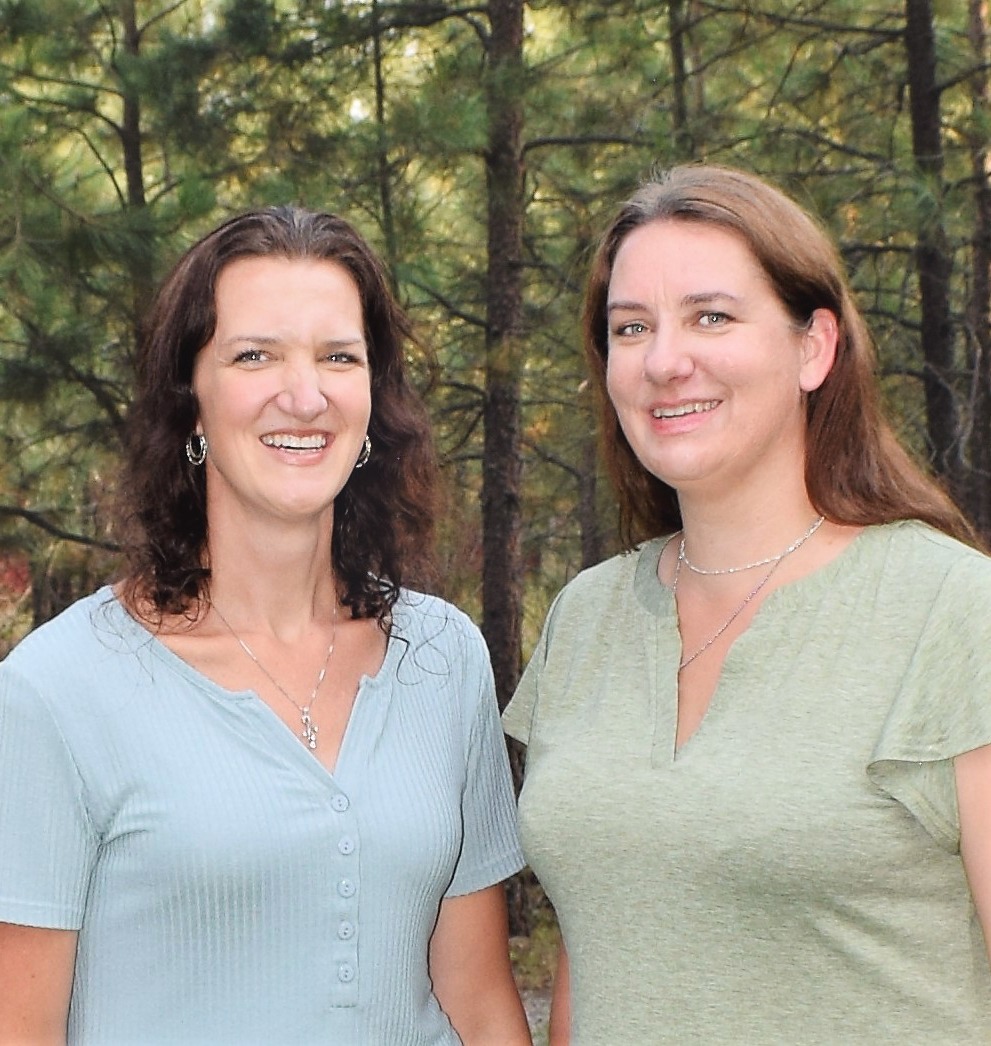
The Layers of Learning Podcast with Karen and Michelle is here to help you get your whole family learning together in your homeschool. We are the sisters behind Layers of Learning. We love getting together to chat about homeschooling and this podcast is just a series of our chats. We’re inviting you to listen in on our conversations.
We both have big families, but we teach almost all of our school subjects to everyone at once. We want to help you find the joy in that too, so we talk a lot about family homeschooling. To see all of our episodes, visit our Layers of Learning Podcast Page. Join us as we explore how to have a happy, hands-on, family-style homeschool.
Teaching Independence

Teaching independence is hard because it’s something that happens over a long time in a lot of tiny ways. It’s hard to measure and it can’t be taught in a day. Michelle, in particular, LOVES fostering independence. Karen got to ask her all kinds of questions about how she has successfully fostered independence in her six boys as she has raised them.
Teaching independence can start much earlier than many parents think. From the time they are little, we need to equip kids to be prepared to live their own lives. Teaching them life skills so that they gain competance and are eqipped know how to do things not only instills independence but also confidence. Along the way, you have to let go of some of your expectations. It is much easier and faster to do things on your own (and the jobs are done better too!), but if you do everything for your kids, they will never learn to do those things on their own. In the end, if you take the time and put in the work to teach your kids skills, they will be able to accomplish things well on their own. Teach kids how to do something, then let them do it, and then don’t expect it to be perfect. Along the way, be consistent with your expectations and have clear consequences along with lots of positive praise. Independence yields maturity and responsibility.
Here Are A Few Topics You’ll Hear About In This Podcast
- Bit by bit, teach kids how to do each household chore and do it well – laundry, dishes, vacuuming, cooking – your household is the beginning of teaching independence.
- Always keep a kid by your side as you work; you are their life mentor and there is a lot they can learn by watching you and working with you. (You can see a bit more about this and other ways we keep a tidy home in this post!)
- Rotate chores among everyone in your family so they all know how to do all of the tasks well.
- Younger kids naturally have smaller consequences, so teaching your kids independence when they are young is helpful; the consequences aren’t huge or severe yet. The older kids get, the steeper the consequences.
- It’s hard to watch your kids suffer from consequences but those consequences will often be the catalyst for learning.
- Even as a homeschool parent, sometimes you should have due dates, grades, and firm expectations so kids learn to be accountable. Have expectations and follow through so kids learn to live up to their responsibilities.
- Don’t take away their consquences or emotional burdens.
- Establish set consequences and follow through on them.
- Check up on your kids – be their accountability check. We are all accountable to people – bosses, bill collectors, government agencies, and many more people. Kids need to learn this in order to function well in the world.
- Expect progress instead of perfection.
Podcast: Play in new window | Download
Subscribe: Apple Podcasts | Spotify | Podcast Index | Email | Deezer | RSS
Get a Free Unit
Choose between the first unit in each Layers of Learning subject to try for free when you sign up for the newsletter.
We never spam and you can cancel your subscription at any time.


This was great, thank you, and was great (old fashioned, often now forgotten) common sense and advice for applying to chores and responsibilities around the home. I agree with you, that it helps build respect between the child and the parent if they are asked to do things around the home, and appreciation for the work of the parent. I also think it helps the child feel valued, if they feel needed in the home.
However, I would love to know how you guys do this with a family style home ed curriculum? I’m guessing this must be only for the non-family style elements, such as the writing assignments, maths and reading. I do not understand how independence can be applied to family style units – as the children rely on the parent for the craft activities etc?
I guess what I’m looking for is…. how did you adapt your home ed delivery, for the tween years, to get them ready for teenage years? What did you do in order to get them to step up their game with their work? I know this is about expectations of the parent, and scaffolding / showing them what you’re looking for, but I would REALLY appreciate a post or a podcast on this topic please. How did you adapt LOL for tweens/teenagers / high schoolers please? Did you take out a library book for them, assign a research / writing project, and give them a due date….?? How did you build up to this, and what steps did you put in place for their options and exams etc – or did they even do exams? I’m in the U.K. so things might be different here, but I would really appreciate to hear your thoughts on this, as we absolutely love LOL, but my eldest child would be starting secondary (high) school in September, so I’m trying to think about how to help her step up her game (she’s not the most motivated or driven of workers).
Thanks again, we love LOL and appreciate all the experience and time you put into it!
I just found the homeschool podcast… please ignore my previous comment!
You guys are amazing – always ahead of the game!!
Thank you!!